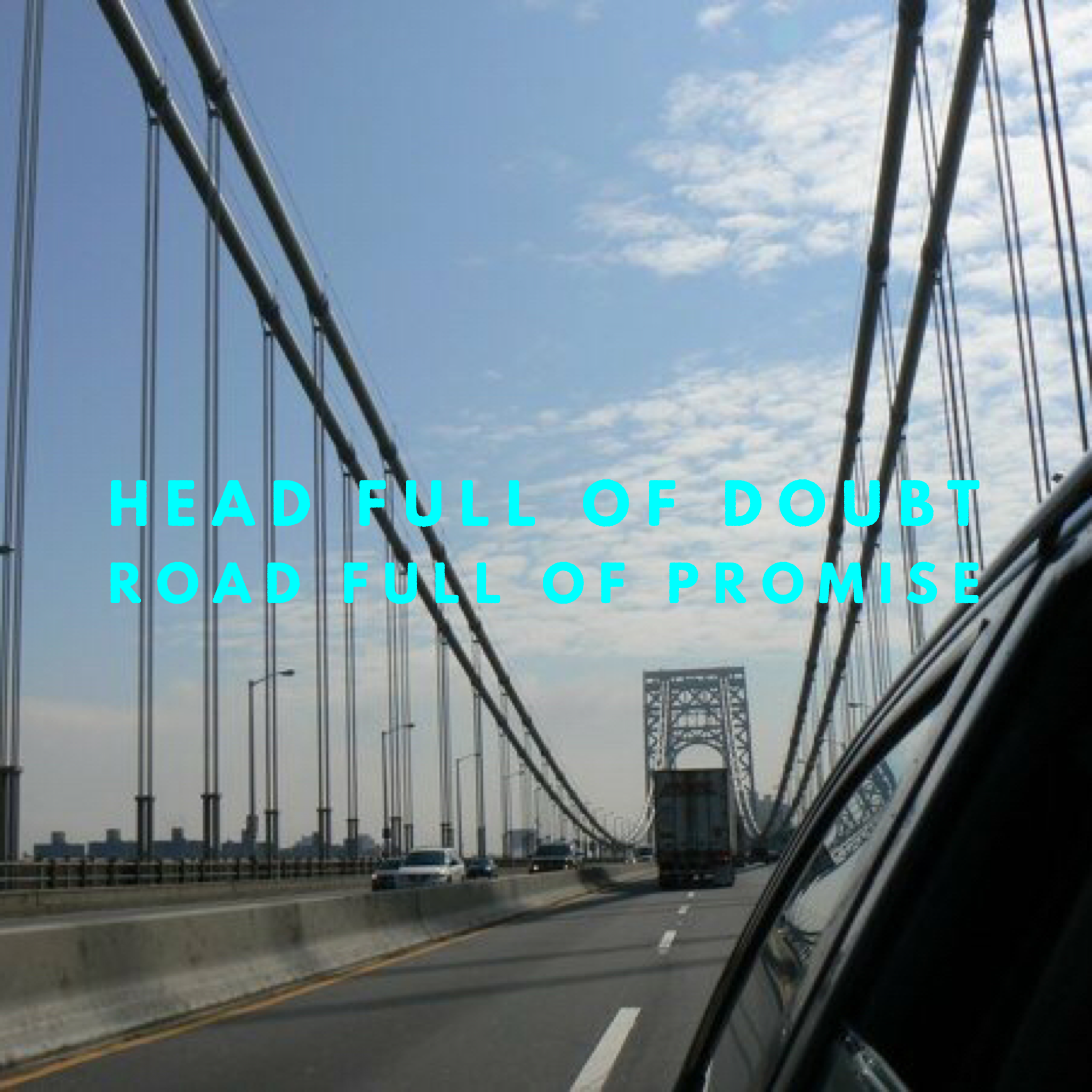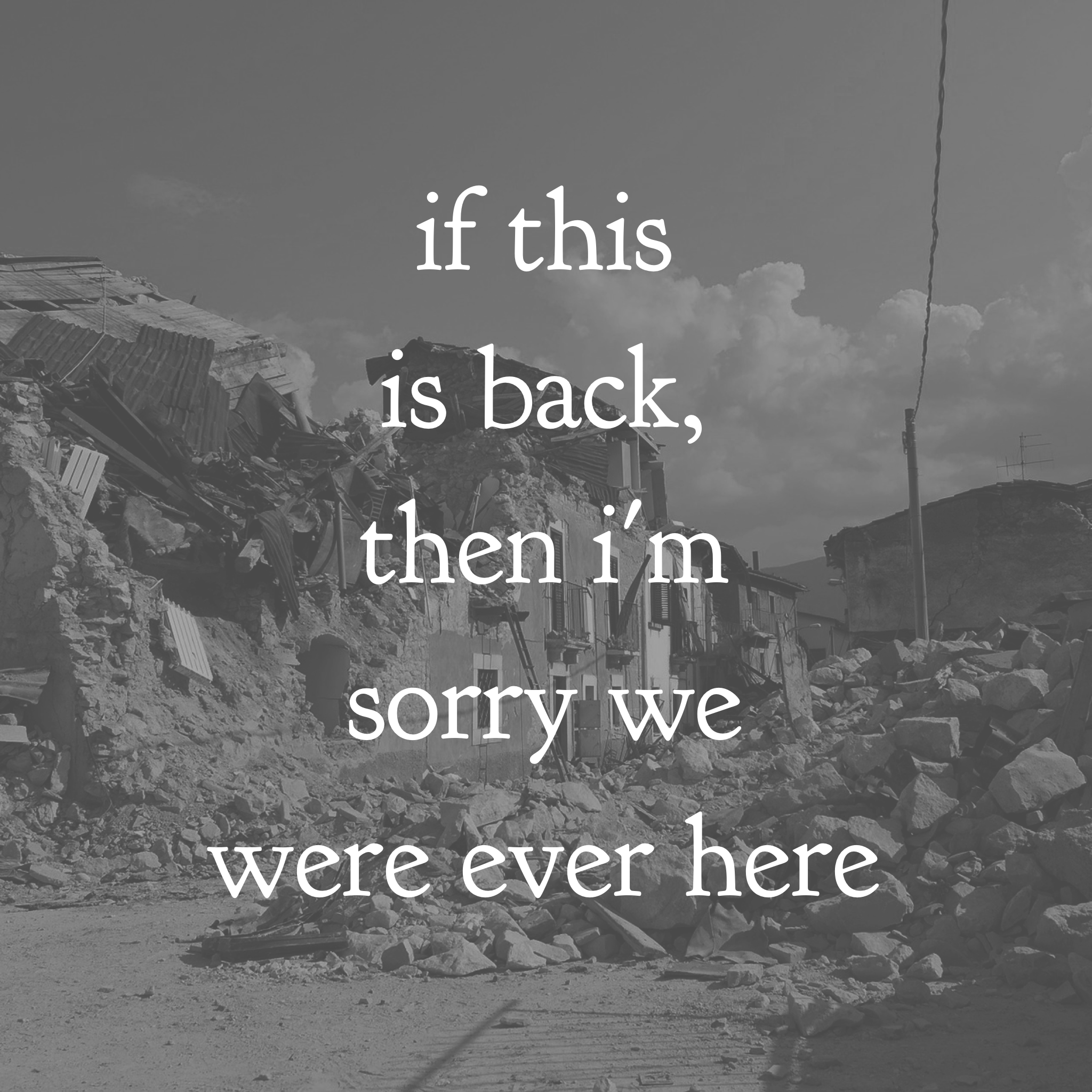Head Full of Doubt/Road Full of Promise (Matt. 28:16-20 & John 20:24-29)
The following is my sermon manuscript from my message at The Bridge worship service at Woodmont Christian Church on April 23. I was super tired and kind of sick so this is definitely not what I said, but this was the gist. John 20:24-29 is part of the lectionary gospel passage for the Second Sunday of Easter (Year A). Also, a tip of the hat for the sermon title to the Avett Brothers, about whose song I probably could write another whole sermon.
I remember wet socks. Whenever I think about my baptism, wet socks are the first thing that jumps to my mind. Socks completely submerged in water feel funny. But beyond the socks, I remember the white robe. I remember the darkness outside the sanctuary because it was an evening worship service and I was only used to seeing daylight through those windows. I remember my family sitting in the front pews and the pride on their face. I remember wading in the baptismal pool out to my dad; pride on his face. I remember being buried with Jesus in death and going under the water and hearing my dad say, “Raised up to walk in newness of life.” I was seven years old and I was as sure of God’s love as I was of those wet socks and the love of my family. I am not as certain now of that as I was when I was seven and yet here I am.
Baptism has been on my mind this week. The Matthew passage was selected as the text because upstairs today over two dozen fifth graders are being baptized. Baptism has also been on my mind because it seems like nearly every time I’ve gone outside the past few days, the weather has tried to drown me. So it’s the week after Easter and we remember baptism and new beginnings and Jesus giving his followers this Great Commission. It’s a celebratory day. So why did I undercut a cute-ish baptism story with an admittance of doubt? Well, I am following the lead of Matthew and the tradition of the church at large.
I have to admit that I did not notice the statement that serves as a prelude to the Great Commission. I grew up Baptist and the Great Commission—“Go therefore and make disciples of all nations, baptizing them in the name of the Father and of the Son and of the Holy Spirit, teaching them to obey everything I have commanded you, and surely I am with you always even to the very end of the age”—that was our jam. When it came time to memorize Bible verses, it was John 3:16, the Great Commission, and “Jesus wept.” I have read and taught on the Great Commission many, many times. That’s why it’s kind of embarrassing to admit that I have frequently bypassed the beginning of the passage.
So let me read it again: “Now the eleven disciples went to Galilee, to the mountain to which Jesus had directed them. When they saw him, they worshiped, but some doubted.”
Some doubted. I remember listening to a podcast recently and the minister Rob Bell was chiding Matthew for his rookie writing mistake. If you are trying to convince people that Jesus is the Messiah, one of the last things you want to include is that some of his closest friends were still uncertain after the resurrection. That’s like Propaganda 101. Part of me has to laugh, because I imagine that Jesus had to be super frustrated. I can see him saying, “Well…uh, guys, that was kind of my grand finale. I’m not sure what else I can do for you.” Jesus, who had been brutally executed, was standing in front of them alive and some were like “Eh…I don’t know…”
Doubt seems like an odd note to sing the week after Easter and on a day when we celebrate baptism to boot. Yet it is actually common for churches to do this. The other passage that was read earlier—Thomas doubting the disciples’ reports of the resurrection—is the common text for the week after Easter in many churches. It makes sense. On Easter Sunday we proclaim that death has been defeated and that good has ultimately triumphed over evil. Yet if we are going to be honest with ourselves, many of us hear that message, look at the world around us, and will hesitantly say, “Eh…I don’t know…”
We see hatred persist, suffering spread far and wide, and we see corners of the church silent on or even contributing to some of the ills that plague this world. Death feels like it’s hanging around and evil seems to keep throwing haymakers at good. So I think that this element of uncertainty is proper for us right after Easter. If we’re really going to proclaim the good news of Jesus in this world, we ought to do it with clear eyes.
There are some who believe that people of faith should ditch doubt and shun questions. I remember well-meaning Sunday school lessons from my youth that looked down on “Doubting” Thomas. He was a failure of a disciple. As I got older and went off to study religion in college, I was warned by caring people to not let my professors make me question my faith. Which is an odd way to put it because no one can make me ask questions but me. But the fear was that if I started asking questions about various aspects of the Bible then my faith would never be the same. Truth be told, they were right. My faith when I graduated from college didn’t look like it did when I was 18. Of course, my faith now doesn’t look like it did when I was 22 or 27 or 30 or so on.
I have come to see that asking questions about faith helps it to mature and develop. It isn’t doubt for doubt’s sake. It is doubt because this is a crazy world that throws a lot at us and it would be ridiculous not to ask questions. Tim Keller, a pastor in New York who is far more eloquent than I, once said, “A faith without some doubts is like a human body without antibodies. People who blithely go through life too busy or indifferent to ask hard questions about why they believe as they do will find themselves defenseless against either the experience of tragedy or the probing questions of a smart skeptic.”
This is why I half-seriously refer to Thomas as my patron saint. Where some Sunday school teachers saw little faith, I saw someone who was trying to love God with his mind as well as his heart, soul, and being. Thomas had some reasonable questions. People do not normally come back from the dead. That is not a common occurrence and I realize that Jesus is not what we would call normal. Yet still if you or I saw someone we loved die and then our friends later came to tell us that that person was no longer dead, we would likely want some kind of proof. I feel like that is legitimate.
Jesus doesn’t kick Thomas out for these questions. He appears to the disciple and Thomas—Questioning Thomas—is the first disciple in the gospel of John to refer to Jesus as “My Lord and my God.”
Then I think about those disciples on that Great Commission mountain. Jesus appears to them and he is alive and yet there is still some uncertainty. I wonder what exactly that was about. I wonder if the trauma of their teacher’s arrest and execution combined with this unprecedented resurrection to the point which they had no earthly idea what to do with it all. They had been on this brutal emotional roller coaster. The man they had put their hope in was arrested and killed. Their hopes seemed to have been laughably misplaced. They abandoned him, but now he was back. Can your head get over your heart getting ripped out? Part of me laughs that they doubted when Jesus was right there, but part of me gets it too.
Concerning these uncertain followers, the commentator Ulrich Luz wrote, “With Matthew the disciples’ faith is not a certainty elevated beyond all conflictedness; it lives between trust and despondency, between certainty and faith. The ‘person of little faith’ prays repeatedly to the Lord. Little faith is not conquered by Jesus once and for all…he lets his disciples remain in their conflictedness and turns to them with his word.”
All of which is to say there is a place in this community for those who are uncertain. There is a home in God’s family for those who have questions. A head full of doubt does not disqualify you from following Jesus. Like Thomas, those disciples with doubt were not asked to leave the mountain. Matthew says there were the eleven there and we know that those eleven would go on to spread the good news of Jesus in an unbelievably prolific way; even those who doubted. They weren’t omitted from the Great Commission.
I find comfort in that. I’ve alluded to the doubt that I have faced in my own life and haven’t gotten into specifics because it can change with the season of my life. There have been times when I have doubted if this whole Jesus, Christian thing is true. That is not what usually plagues me. I am fairly comfortable with paradox, but I still struggle with that from time to time. I question often whether we Christians—especially us white American Christians—have completely lost the plot.
I doubt myself a fair amount. I doubt whether I am cut out for this following Jesus thing. I doubt sometimes whether God could love me. I doubt whether my theology is right. I think almost every time I say something in staff meeting that I worry is not kosher, I ask out loud whether I’m making sense or am off the reservation. Part of that is because there are people in my past—thankfully not super close to me—who will show a person the door if they don’t believe the right things. You see that enough and it causes you to constantly doubt yourself.
My intention in sharing these doubts is not to fish for any sort of pity. It is simply to be honest and say that I have these questions bouncing around inside of me. And I imagine that most of the people in this room would be honest enough to let you know that they have their uncertainties as well. The people who follow Jesus are flawed, conflicted, and do not have everything figured out by any stretch of the imagination. Yet in all of this I believe there is something about Jesus. I believe that he shows us what God is like. I believe, most days, in what I said on Easter Sunday that Christ is risen.
Now how do I put one foot in front of the other down the road following Jesus when my head is so full of doubt at times? Interestingly, the call that Jesus gives to the eleven—the Great Commission—has signposts that help me continue on even when I’m uncertain.
Jesus starts, “Go therefore and make disciples of all nations.” The fact that Jesus opens the door to all the nations indicates that God’s family is going to be a motley crew. Of course, we already had a preview of that in the gospels. Jesus built community with all sorts of people: the religious, the people on the margins, the acceptable, the scandalous, everyone. Jesus was building a big tent. He obviously wanted the good news to be taken to the people of Israel spread among the nations, but also those who weren't Jewish. That aspect actually caused a bit of a kerfuffle in the early church because there was not an agreement on what to do with these people who were considered outsiders.
When you are bringing in women and men from all nations, there is going to be a fair amount of diversity coming through the doors. They are going to come in with cultural contexts and life experiences that—even though they are baptized into Jesus—do not disappear. Those differences are important, even vital to the growth of the church. So when Jesus asks his followers to go to all corners of the world to make disciples, it helps me realize that there is a place for me as well. If a person from any nation can sit at the table, so can you and I.
Jesus continues, “Baptizing them in the name of the Father, and of the Son, and of the Holy Spirit.” Baptism is a sign of our entry into the faith, no matter how you experience it. When I was in college, I was introduced to the instruction “Remember your baptism.” So I try to remember that evening when I was seven years old, but I have come to understand that there have been baptisms throughout my life: moments where I realize that God is saving me, cleaning me, creating me, and making me new again.
They are moments stretched throughout my life. When I was two years old and a vicious wave tore me from dad’s arms and he dove in blindly and somehow found me. When I was playing bass guitar at a church camp and the lyric, “If grace is an ocean, we’re all sinking” came out of my normally reserved voice like a trumpet of joy. When I was running during a really difficult period last year and the sky opened up and drenched me but the sun still shone.
All of those are obviously really personal and probably don’t mean anything to you out of context. But the memories mean the world to me. They’re also not all water-related. But remember your baptism. Remember the times when God seemed more real than anything and hold on to those memories until your knuckles turn white. Jesus told his disciples to baptize others and the dual blessing is for every person that enters the faith, we get the opportunity to remember our births and re-births into God’s family.
And Jesus continued, “Teaching them to obey everything that I have commanded you.” It is probably not a coincidence that Jesus gives this instruction from a mountain when the most complete body of his teaching in Matthew is given from another mountain. Jesus wants his followers to live out the way that he taught. The church is his school and we need to continue to learn and re-learn the ways that Jesus tells us to go. I mentioned earlier that I often do not struggle with whether Jesus rose from the dead or whether God is real. But I feel like if this world here was all there was, if there was no afterlife that the teachings of Jesus are still something that I would want to strive after in my life.
I feel like loving your enemy and not giving yourself over to anger or lust, letting your light shine in the darkness, not running after material things, even expressing need and gratitude through prayer, I feel like all of this would still be worthwhile. I am not one of those people who think that Jesus was just a good moral teacher, but at the same time his teaching is so incredibly valuable. Even on the days when I’m not sure about everything, I still want to believe in a world where peacemakers and the pure in heart are blessed. I can at least hang my hat on that.
Finally, Jesus says, “And remember I am with you always, to the end of the age.” I understand that believing that takes a bit of a leap of faith. What does Jesus being with us day by day even look like? How do we know? But it’s a leap that I’m willing to take. It is the promise that makes walking this road worthwhile even when I am flooded with doubts, questions, and uncertainties. In the beginning of Matthew, we are introduced to Jesus as Immanuel or “God with us.”
This is the God who is present with people not just some deity sitting far off in a cloud. The God who sits with us in our ordinariness, our doubts, our confidence, our heartbreak, and our joy. The God who is among us even on those days when it seems like death is hanging around and evil is putting up a nasty fight. God with us, inviting us to join in the places where God is healing the wounds in this world.
Jesus says, “I am with you always, to the very end.” That promise helps get me out the door most days; at least the days when I’m not a stubborn idiot. That promise pushes me to follow that calling that Jesus gave those eleven believing and yet still uncertain disciples. That promise can change a lot.
So it is my prayer that in the Great Commission, you do not only hear what each and every single one of us is called to do. But that you would also find the reminders and fuel you need to simply be in God’s family even when you are filled with uncertainty. You belong in this big, diverse motley crew. Remember your baptism. Hold fast to the teachings of Jesus. Remember that Jesus is with you always, every day to the very end. Amen.






